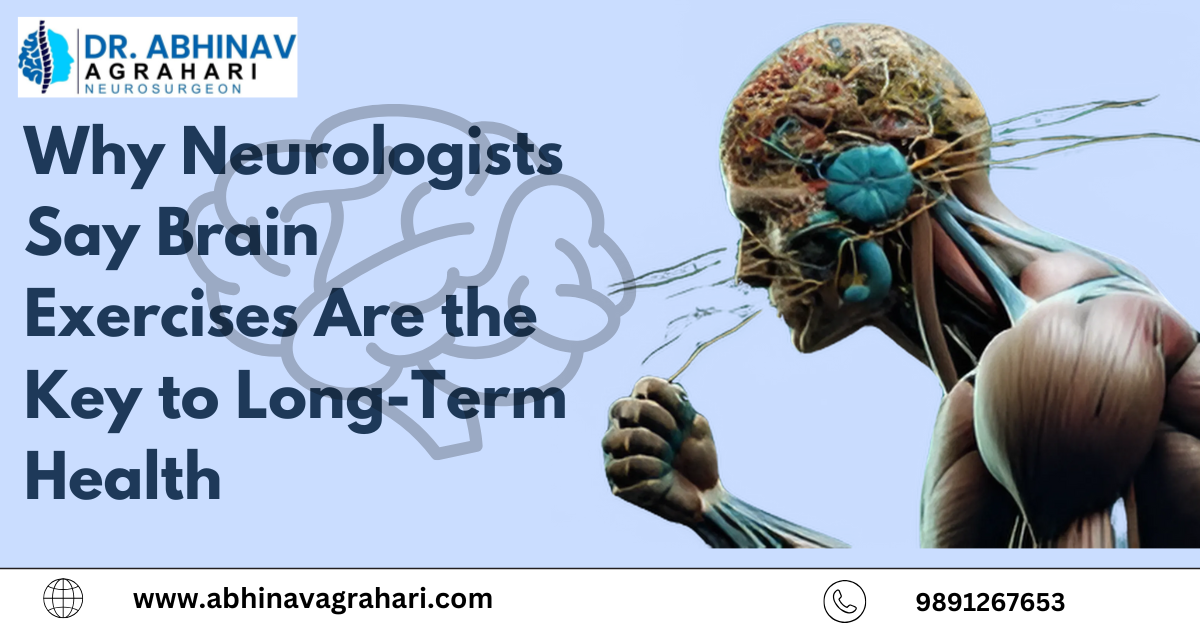Why Neurologists Say Brain Exercises Are the Key to Long-Term Health

Keeping the brain active is essential for long-term cognitive health. Neurologists emphasize the importance of mental stimulation to maintain memory, enhance focus, and delay age-related decline. Simple daily exercises can strengthen neural connections and improve overall well-being.
The Science Behind Brain Exercises and Cognitive Longevity
The brain is like a muscle; regular use strengthens its function. Studies suggest that engaging in problem-solving, memory games, and creative activities helps maintain cognitive health. Neuroplasticity, the brain’s ability to reorganize itself by forming new neural connections, Best Brain Doctor in Okhla. plays a key role in long-term mental agility.
A study published in Neurology found that people who consistently engage in mentally stimulating activities have a lower risk of cognitive impairment. Activities like reading, learning new skills, and engaging in puzzles can significantly slow cognitive decline.
Additionally, brain exercises enhance the production of neurotransmitters like dopamine and serotonin, improving mood and focus. Engaging in challenging tasks can also reduce stress and prevent mental fatigue.
How Mental Stimulation Strengthens Neural Connections
Neurons communicate through electrical signals and chemical messengers. When you challenge your brain with new experiences, it strengthens existing pathways and builds new ones. This process, known as synaptic plasticity, improves memory, problem-solving skills, and overall cognitive performance.
Research suggests that regular brain training can delay neurodegenerative conditions like Alzheimer’s. Best Brain Treatment in Okhla. Activities such as memory recall, pattern recognition, and logical reasoning contribute to keeping the brain resilient.
Best Brain Exercises to Improve Cognitive Function
Memory Games and Puzzles
Crossword puzzles, Sudoku, and memory card games are excellent for enhancing recall and problem-solving abilities. These activities stimulate multiple areas of the brain, improving focus and cognitive agility.
Learning New Skills and Languages
Picking up a new hobby, such as playing an instrument or learning a language, challenges the brain in ways that enhance long-term memory and adaptability. Studies show that bilingual individuals have a higher cognitive reserve, Best Brain Doctor in Okhla .which helps delay dementia symptoms.
Meditation and Mindfulness Practices
Meditation not only reduces stress but also strengthens areas of the brain associated with memory and concentration. Mindfulness practices increase gray matter density, which improves decision-making and emotional regulation.
Physical Activity and Its Impact on Brain Health
Regular exercise improves blood flow to the brain, delivering oxygen and nutrients that promote cognitive function. Aerobic activities like walking, jogging, and dancing can enhance memory retention and reduce the risk of neurological disorders.
Common Myths About Brain Training
- Myth: Only seniors need to do brain exercises.
Fact: Brain training benefits people of all ages by improving focus, creativity, and problem-solving skills. - Myth: Brain games are the only way to improve cognitive function.
Fact: A mix of activities, including learning new skills and physical exercise, is essential for brain health. - Myth: Intelligence is fixed, and brain exercises don’t help.
Fact: Neuroplasticity proves that the brain can adapt and improve with consistent training.
Practical Tips to Make Brain Exercises a Daily Habit
- Set aside at least 15 minutes a day for a cognitive challenge, such as solving a puzzle or reading a new topic.
- Engage in social interactions that involve strategic thinking, like chess or group discussions.
- Keep learning new skills—whether it’s a musical instrument, cooking technique, or language.
- Incorporate mindfulness practices like meditation to enhance focus and emotional resilience.
Conclusion: A Sharper Mind for a Healthier Future
Brain exercises are a simple yet powerful way to maintain cognitive health. Engaging in activities that challenge your mind can improve memory, enhance focus, and reduce the risk of neurodegenerative diseases. By making brain training a daily habit, you can enjoy a sharper mind and better mental agility for years to come.
